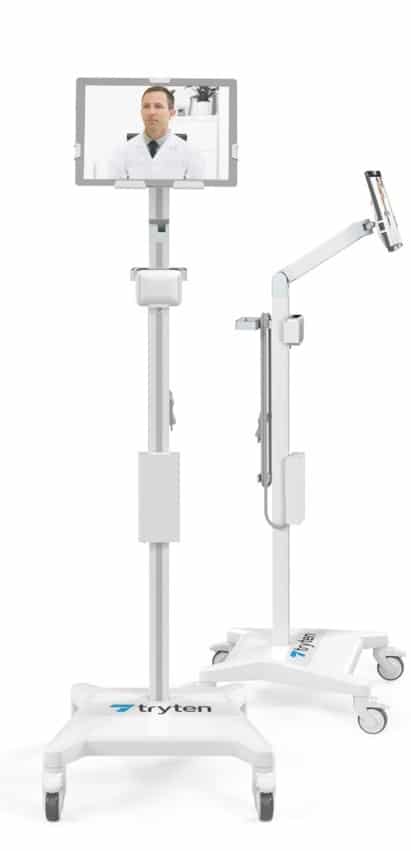Tryten notes COVID-19 is hitting record high infections, hospitalizations, and ICU bed occupancy reports
The company recently surpassed 500,000 deaths due to the virus. Hospitals and community health centers need solutions to rapidly meet the increasing demand for remote providers to safely access their patients. Healthcare delivery is moving into stadiums, temporary tents, and reconfigured hospital facilities.
Providers need access to many different locations to support vaccinations, testing, and delivery of care. Tablet-based virtual rounding can quickly bring remote experts to the point of care to safely leverage expertise across different locations. Curbside virtual care can move to stadiums, and temporary locations to expedite the delivery of vaccines and patient care.
Tryten’s Virtual Rounding Assistant-Tablet Cart is lightweight, easy to position and install. It supports BYO tablet and video. It is easily incorporated into current IT architectures. The elegant design includes cable management, an easy-to-position articulating arm, and various secure tablet mounts to enable rotation and tilt of the tablet. Tryten partners are available to provide the total solution including tablet, video, and services.
“Many have turned to virtual care to provide safe ways to leverage their resources. Virtual rounding has surfaced as an important tool to bring care to patients safely and to workload balance across providers. Tryten’s Virtual Rounding Assistant -Tablet Cart enables healthcare organizations to quickly mobilize their tablets and video telehealth tools. It can be deployed to support vaccination, triage, and testing. Nurses can use it as they collect vitals or doctors can use it for telehealth and rounding. We are determined to do our part to fight the virus and help those on the frontlines,” said Dr. Deborah Jeffries, Global Director of Healthcare for Tryten.
Tony Janzen, CEO and Founder of the company states, “Tryten is making every effort to bring effective, easy-to-deploy solutions to the market that can support our efforts to defeat COVID-19. Our entire team is focused on ways we can make a difference.”



